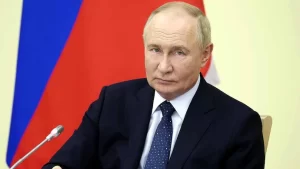US Intelligence Downplays Likelihood of Nuclear Attack Despite Putin’s Threats

Recent warnings from Russian President Vladimir Putin regarding the potential use of nuclear weapons have heightened global tensions. However, U.S. intelligence assessments suggest that the likelihood of such an attack remains minimal. Analysts point to several reasons, including Russia’s calculated approach to escalation and the severe global consequences a nuclear strike would entail. While rhetoric around nuclear capabilities has intensified amidst the ongoing Russia-Ukraine conflict, experts believe that such threats are primarily intended to deter Western support for Ukraine rather than signal an immediate intent to act.
Putin’s warnings, often couched in ambiguous language, serve as a reminder of Russia’s formidable arsenal. Yet, military and political experts argue that resorting to nuclear force would undermine Russia’s own strategic objectives. A nuclear strike would not only isolate Moscow on the international stage but also provoke retaliatory measures from NATO and allied nations, potentially leading to a catastrophic global conflict. The Kremlin, aware of these ramifications, seems more focused on leveraging its nuclear threats to influence diplomatic outcomes rather than pursue actual deployment.
The U.S. intelligence community closely monitors any signs of preparation for a nuclear strike. So far, there has been no evidence to suggest that Russia is moving its nuclear forces into a state of heightened readiness. Instead, Putin’s statements align with his broader strategy of using intimidation to fracture international support for Ukraine and deter additional military aid. Analysts emphasize that these warnings are part of a calculated information campaign designed to sow fear and uncertainty.
Despite the relatively low risk of an immediate nuclear strike, the situation demands vigilance. The international community must continue to engage in dialogue while maintaining a robust deterrent posture to prevent any miscalculation. Ensuring that diplomatic channels remain open is crucial in managing the risk of escalation and avoiding scenarios that could spiral out of control.
In conclusion, while Putin’s nuclear rhetoric cannot be dismissed outright, U.S. intelligence suggests that such threats are unlikely to translate into action. The focus should remain on addressing the ongoing conflict through diplomatic, economic, and military strategies that promote stability without escalating into a nuclear confrontation.
